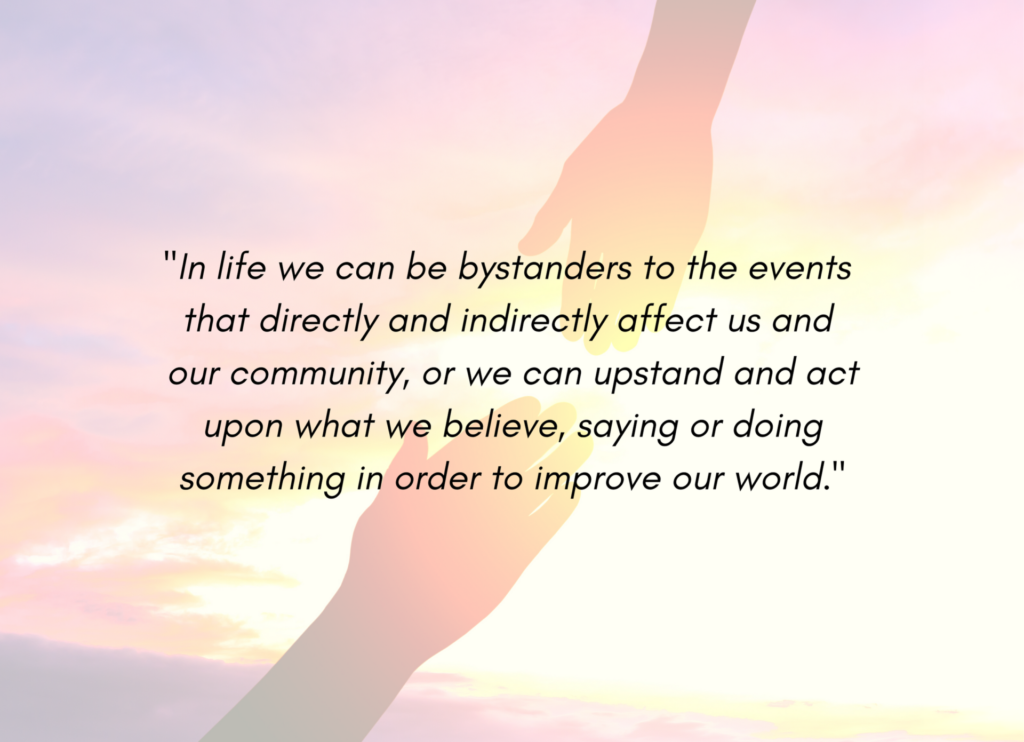Be an Upstander, Not a Bystander

November 26, 2021
Dreams, dreams, and more dreams. This is a central theme of this week’s Torah portion, Vayeshev. Yes, the parshah takes us along the journey of Joseph’s life from childhood, through servitude, then prison, and finally as interpreter of dreams. And yes, although Joseph’s initial dreams present his elevated status above his brothers, including his second dream of presenting himself above even his mother and father! However, it is not until later in his life that we come to appreciate Joseph’s true prophetic abilities to interpret the dreams of others for their own benefit and not for his personal gain.
In fact, many of us can remember the Joseph narrative because of Hollywood and Broadway’s dramatization, as well as because of the thousands of children’s books typifying the underdog story; and then there’s the family drama -the emotional highs and lows- and even the final confrontation with his estranged family. The story of Joseph is simply too good not to tell and retell time and again.
Yet, even with all this other great content, especially on family dynamics and community relations, I’d like to focus our attention this week on the two dreams that Joseph interpreted while serving time in Pharaoh’s jail. The first dream was of Pharaoh’s “chief cupbearer” (some interpret as “butler,” others as Pharaoh’s “sommelier”). His dream was as follows:
“In my dream, behold, a vine was before me; and within the vine were three branches; and as it was budding, its blossoms shot forth, and the clusters brought forth ripe grapes, and Pharaoh’s cup was in my hand; and I took the grapes, and squeezed them into Pharaoh’s cup, and I passed the cup into Pharaoh’s hand.” (Genesis 40:9-11)
Joseph happily interprets the butler’s dream, with a message of hope and release from jail on the third day following the dream, at which point the Pharaoh’s baker decides that he too wants his dream now interpreted:
“I also saw in my dream, behold, three baskets were on my head; and in the uppermost basket there was an assortment of goods prepared by a baker for Pharaoh; and the birds were eating the baked goods out of the basket on top of my head.” (Genesis 40:16-17)
Unfortunately, Joseph’s interpretation of the baker’s dream was not as hopeful. The result of this dream was the eventual execution of the baker three days following his dream.
So why such different results to two seemingly similar dreams? The answer is actually a lesson that the Holocaust Memorial Museum of San Antonio teaches every day to its visitors… Be an upstander, not a bystander!
With a closer more critical eye of these two dreams, we read that the butler is an active participant in his life. The butler reaches out to Joseph and asks him to interpret his dream. The butler “takes the grapes;” the butler “squeezes the grapes.” The butler passes the cup to Pharaoh.
Alternatively, the baker only asks Joseph to interpret his dreams after the butler gets a positive interpretation to his dream. The baker doesn’t take accountability for baking the assortment of goods in his baskets. The baker doesn’t even take responsibility for the baked goods being eaten… he “blames” the birds.
In life we can be bystanders to the events that directly and indirectly affect us and our community, or we can upstand and act upon what we believe, saying or doing something in order to improve our world. Thanksgiving is our time to appreciate the blessings that have been bestowed upon us, and to recognize the ones we love and the light they bring into our lives.
This week’s Torah portion asks us to consider sharing those blessings with others and taking direct action, to be an upstander to those in our community with less and who are more vulnerable than ourselves. This week’s “ask” is to please click HERE to consider contributing to the San Antonio Jewish community’s annual campaign. Any amount makes a real and tangible difference, and a gift of $180 can help a family in need provide food for the week, or an isolated senior engage with their peers for some social time, or a community member receive their necessary mental health support.
But no matter your decision to participate today or not, please know that the Jewish Federation is here today because of upstanders who joined together in 1927 so we could be here for you, for our community, and for our future. We are…
Shabbat shalom,

